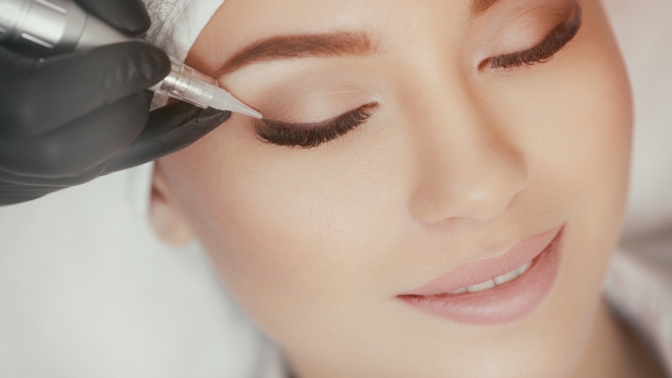Permanent makeup, also known as cosmetic tattooing, has revolutionized the beauty industry by offering convenience and long-lasting results. However, not all outcomes are positive. One less-discussed but significant concern is permanent makeup hyperpigmentation, a darkening of the skin that can occur after certain procedures, often referred to as tattoo hyperpigmentation in the cosmetic tattooing world.
If you’re considering permanent makeup for hyperpigmentation or have experienced it already, this blog will break down everything you need to know. We’ll explore its causes, identify possible solutions, discuss prevention tips, and weigh the pros and cons to help you make informed decisions.
What Is Permanent Makeup Hyperpigmentation?
Hyperpigmentation in permanent makeup is the unwanted darkening of the skin following a cosmetic tattoo procedure, such as microblading, lip blush, or eyeliner tattooing. Instead of achieving the effortless, natural look intended, the pigment can appear darker or even uneven, which can be frustrating for clients.
Though rare, this phenomenon, also labeled tattoo hyperpigmentation or post-inflammatory hyperpigmentation, has multiple causes and can affect various skin types differently. Understanding its root causes is critical to minimizing the risk and improving results.
Common Causes of Permanent Makeup Hyperpigmentation
Understanding why hyperpigmentation after permanent makeup may occur is essential to preventing it. Here are the most common causes of permanent makeup hyperpigmentation:
- Skin Trauma
Permanent makeup procedures involve puncturing the skin with needles to deposit pigment. This can traumatize the dermis, triggering an excessive production of melanin, especially for individuals prone to tattoo hyperpigmentation or post-inflammatory hyperpigmentation. - Sun Exposure
UV rays are a major culprit behind hyperpigmentation after tattooing. When newly-tattooed skin is exposed to sunlight or artificial UV light (like tanning beds), melanin production surges, potentially darkening the tattooed area. - Improper Aftercare
Neglecting aftercare instructions, such as failing to avoid hot baths, aggressive washing, or picking at scabs, can exacerbate skin irritation and lead to cosmetic tattoo hyperpigmentation. - Skin Type
Individuals with darker skin tones (Fitzpatrick skin types IV-VI) are genetically predisposed to hyperpigmentation, including tattoo hyperpigmentation, due to naturally higher melanin levels. This group should be especially cautious when undergoing permanent makeup for hyperpigmentation or cosmetic tattoo treatments. - Allergic Reactions or Pigment Quality
Some pigments used in permanent makeup may cause adverse skin reactions, leading to uneven pigment deposits and secondary hyperpigmentation. Lower-quality pigments with unsafe ingredients pose a greater risk. - Overworking the Skin During the Procedure
If the technician passes over the same area repeatedly or applies excessive pressure, the risk of tattoo hyperpigmentation increases. Skilled, experienced artists are less likely to make this mistake.
Solutions for Permanent Makeup Hyperpigmentation
While permanent makeup hyperpigmentation can be discouraging, there are several options to treat and manage it effectively.
- Topical Treatments
Over-the-counter products such as hydroquinone, retinoids, and vitamin C serums are effective treatments for minor cases of hyperpigmentation. These products help brighten the skin by inhibiting melanin production and encouraging cell turnover. - Laser Therapy
For more severe cases of tattoo hyperpigmentation, lasers such as Q-switched lasers are popular for reducing pigmentation. However, laser treatments must be performed cautiously, especially on darker skin tones, as they can sometimes worsen the condition. - Chemical Peels
Mild chemical peels containing glycolic acid or salicylic acid can help exfoliate the skin and reduce hyperpigmentation after permanent makeup. Avoid aggressive peels that might irritate the skin further. - Microneedling
Microneedling combined with serums such as hyaluronic acid is another option to reduce dark spots while improving skin texture. - Correction Treatments by Experts
A skilled permanent makeup artist specializing in correction treatments can adjust uneven pigmentation or discoloration. Avoid DIY fixes and consult professionals for the best outcomes when dealing with tattoo hyperpigmentation.
Preventing Permanent Makeup Hyperpigmentation
Prevention is undoubtedly better than cure, especially when it comes to permanent makeup for hyperpigmentation. Here’s how you can minimize your risk of adverse outcomes.
- Choose a Trained Professional
Selecting an experienced permanent makeup artist with credible certifications and a robust portfolio is critical. Skilled artists know the correct techniques to minimize skin trauma and use high-quality pigments that reduce the risk of hyperpigmentation. - Follow Aftercare Instructions
Aftercare is non-negotiable. Follow these tips:
- Avoid direct sunlight for at least 2 weeks.
- Keep the treated area clean and moisturized.
- Avoid intense workouts, swimming pools, and saunas during the healing period.
- Use Sunscreen Religiously
After the initial healing period, apply sunscreen daily to protect the treated area. Choose sunscreens with at least SPF 30+ and broad-spectrum protection. This is vital in preventing tattoo hyperpigmentation. - Disclose Your Skin History
Be honest about your skin type, history of hyperpigmentation, and any allergies during your consultation. Some skin types may require extra precautions, especially if you’re considering permanent makeup for hyperpigmentation correction. - Consider a Patch Test
Patch tests can help identify whether you’re at risk of hyperpigmentation from a particular pigment or procedure.
Pros and Cons of Permanent Makeup
Before committing, it’s crucial to weigh the advantages and disadvantages of permanent makeup, especially for those concerned about hyperpigmentation.
Pros Permanent Makeup
- Saves Time: Wake up with ready-to-go makeup every morning.
- Long-Lasting Results: Results can last 1–3 years, making it a cost-efficient solution.
- Smudge-Proof Look: Perfect for active lifestyles and those who sweat often.
- Boosts Confidence: Enhances natural features like brows and lips.
Cons Permanent Makeup
- Potential for Complications: Risks include hyperpigmentation, infections, and allergic reactions.
- Healing Period Required: It takes weeks to heal properly.
- Maintenance Treatments Needed: Over time, pigment fades and touch-ups are required.
- Cost Barrier: Quality permanent makeup isn’t cheap.
While permanent makeup hyperpigmentation can seem intimidating, knowledge and preparation are your strongest tools. By choosing a certified professional, following the proper aftercare, and being proactive about prevention, you can enjoy the many benefits of permanent makeup for hyperpigmentation while minimizing the risks.
If you suspect tattoo hyperpigmentation or complications, consult a licensed dermatologist or permanent makeup specialist to explore treatment options tailored to your needs.
Start your permanent makeup journey with confidence, making informed decisions every step of the way. With the right care and expertise, it’s possible to achieve the flawless, low-maintenance look you’ve always wanted.
FAQs
Individuals with darker skin tones (Fitzpatrick types IV-VI) or those prone to skin discoloration are more susceptible to permanent makeup hyperpigmentation.
Yes, in many cases, tattoo hyperpigmentation fades over time. However, treatments like topical creams or professional procedures can speed up the process.
Avoid regular makeup for at least 10–14 days to allow the skin to heal fully and reduce the risk of complications like hyperpigmentation.
Hyperpigmentation is uncommon when procedures are performed by skilled professionals and proper aftercare is followed.
Pigment longevity varies based on skin type, aftercare, and environmental exposure. Typically, cosmetic tattoos last between 1–3 years.




